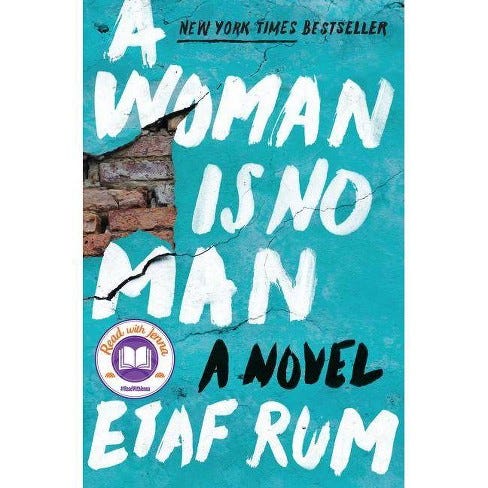'A Woman is No Man': Palestinian American fiction
Etaf Rum's novel breaks the silence about a tightly controlled world.
This post contains an affiliate link or links. If you use a link to buy a book, I may earn a small commission. You can find all the books that have been featured in this newsletter in my Bookshop store.
I hadn’t heard of Etaf Rum’s searing debut novel, “A Woman is No Man,” until a couple of months ago, when I joined a professional organization that had just chosen the book for its book club. Curious as to why a professional organization would select a novel to discuss, I picked up a copy.
Mystery quickly solved. Rum’s novel, based on her experience in a Palestinian immigrant community, plunges us into a world in which women are relegated to lives controlled by expectations of silence and obedience. For the organization I’d just joined, which works to support and advance women of color, the theme was quite relevant.
Rum’s narrative alternates between the stories of two young women: Isra, who arrives at a marriageable age in Palestine in 1990, and Deya, who reaches the same age in Brooklyn 18 years later. They’re connected not only as mother and daughter, but also as devoted readers whose forays into literature give them glimpses of other ways to live.
Only glimpses, though. When Isra is married to an older man her parents deem highly desirable because he’s from America, she finds herself living not only with him but also with his parents and brothers, placing her under constant scrutiny. If she’s judged to have stepped over the line in any way, the consequences are severe, including physical abuse. When she appears one day with facial bruises after a nighttime beating by her husband, her mother-in-law hands her a bottle of foundation and chides her for not concealing her shame.
The only real sympathy or support she gets comes from Sarah, her keen-eyed, sharp-tongued teenage sister-in-law. Sarah has her own struggle: Having been allowed to venture into the outside world to attend high school, she now wants to go to college, much to her parents’ dismay. Marriage first, they tell her. Then, if your husband allows it, you can enroll.
I took it for granted that I’d go to college. But my mother changed my perspective, making me see college as a privilege rather than an entitlement, when she talked about her educational experience.
Like Sarah’s mother, my mother’s mother opposed her desire to go to college. Mom’s parents had supported her through high school; now she owed them, and the family really needed her contribution. Get a job, she was told.
Mom didn’t listen. She took the national college entrance exam and scored high enough to earn admission to National Taiwan University, where tuition was free. Grandma lost that argument, especially when Grandpa took Mom’s side. Mom became the first person in her family to earn a college degree.
“A Woman is No Man” is less triumphant, more complicated. Deya, who’s being raised by her grandparents in the wake of her parents’ deaths, chafes daily at the same restrictions that her mother and her aunt Sarah were subjected to. She’s been kept so isolated that when she decides one day to skip classes at her Islamic school in Brooklyn and go to Manhattan, she can barely navigate the subway or the streets.
She’s been lured to Manhattan by a vague promise from a stranger that seems somehow connected to her mother. What she learns when she arrives at their meeting place hammers a crack into the wall her family has constructed around her, a wall she comes to learn has been built in part upon a lie, a conspiracy of silence.
Ram wrote in an afterword to “A Woman is No Man” that she grappled with mixed emotions about telling a story rooted in the world she grew up in — emotions that included guilt about presenting Arab Americans in such a light. But she felt it was crucial to speak up, break the silence.
We can make stories to save ourselves or that limit ourselves, and shame was the story that controlled the narrative of my life for many years. I let that story be my story. …
What I didn’t understand was that silence itself was the very thing that continued to fuel my shame.




looks like an interesting novel and your review reminds me that my sister-in-law had to fight my mother-in-law to go to college, while it was taken for granted that my husband would do so. This had nothing to do with race, but rather economic status. What money there was for college tuition was reserved for boys.